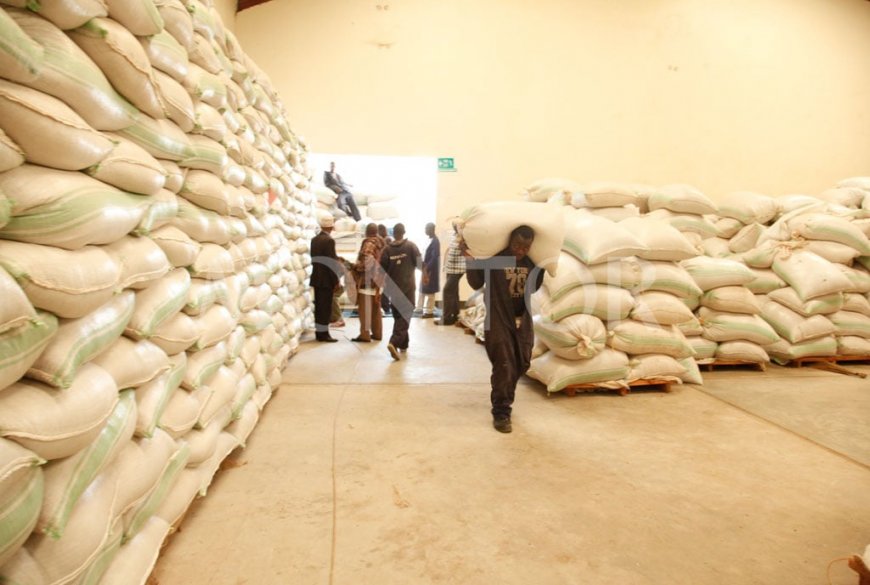Study Links Aflatoxin in Ugandan Maize, to Increase Risk of Liver Cancer, Say Naro Scientists.
Prof Archileo Kaaya, the head of the department of food technology and nutrition at Makerere University, cautions farmers not to dry their agricultural products on the bare ground but put them on a clean surface such as a tarpaulin. Also, they should ensure effective drying of all farm produce to the required moisture content.

Uganda Scientists have warned of deadly consequences of staple foods following findings at Naro of high aflatoxin concentration (100-1000 times higher than World Health Organisation’s threshold) in maize, groundnuts and sorghum produced in Uganda.
https://twitter.com/DailyMonitor/status/1627227282015240192
Naro scientists had linked aflatoxin in maize, groundnuts and sorghum, which they said was confirmed in their studies in all regions of Uganda producing the grains, to causing particularly liver cancer.
The Director of Research at the National Crops Resources Research Institute (NaCRRI), who reported the research findings at the event on February 14, illuminated the cancer exposure risk for consumers of grain contaminated with aflatoxin. This was captured on the record.
The story we eventually published, we referenced development by the researchers of Aflasafe, a product to reduce aflatoxin, which the scientists said they had not patented/registered and, therefore, not started producing on large scale due to, among others, inadequate financing. Thus, it is still a laboratory product and inaccessible on the market for use by farmers or produce dealers.
The story was edited initially to run on inside pages in the dailies, but revised with expanded reporting for a Weekend splash and this followed elaborate internal processes and verification procedures.
For instance, the Acting Weekends Editor, Ms Angella Nampewo, assigned another Reporter, Ms Beatrice Nakibuuka, to co-report the story. She began her assignment by contacting scientists at Naro to double-check accuracy of quotes and narratives in the original edited copy. All the news makers confirmed the accounts as factual and correct.
Naro scientists had linked aflatoxin in maize, groundnuts and sorghum, which they said was confirmed in their studies in all regions of Uganda producing the grains, to causing particularly liver cancer. As is customary with our journalism and in line with provisions of the Nation
Media Group (NMG) Editorial Policy, we believe in and follow the science and scientists.
Prof Archileo Kaaya, the head of the department of food technology and nutrition at Makerere University, said this type of fungi, if present, can grow onto the food, feed on it then produce waste products so when you eat the food, you may suffer food intoxication.
“Aflatoxins are, therefore, a type of toxins that are produced by molds. They are a highly toxic and carcinogenic compounds produced by the fungi Aspergillus flavus,” he said.
Not even cooking or roasting of the plant produce can kill the toxins.
This is because the roasting usually happens at 150 degrees Celsius yet aflatoxins can only be destroyed at 400 degrees Celsius.
Having higher levels of aflatoxin contamination in grains and other agricultural produce has both economic and health impacts to the country.
Many countries that we export to can reject our agricultural produce like what happened to our maize export to Kenya in 2021.
“It is hard to completely eliminate aflatoxins given the high temperature and humidity as in Uganda and the surrounding countries but there is a standardised limit, which is 10 parts per billion (ppb) amount of produce for East Africa and that of Europe (4ppb),” Prof Kaaya said.
Dr Godfrey Asea, the director for research at the National Crops Resources Research Institute (NaCRRI), said the fungus naturally lives in the soil and when the conditions are moist, it sprouts in the air.
However, it is aggravated by handling, where some farmers dry their produce on the bare ground, increasing the risk of molds developing in the produce.
Drought conditions also stress the plants, forcing them to dry before they actually mature, thereby creating favourable conditions for the growth of molds.
“Some farmers leave the produce, especially maize, to dry in the garden but since there is heat during day and dew in the night, molds grow on the maize to produce aflatoxins,” Dr Asea explains.
Prof Archileo Kaaya, the head of the department of food technology and nutrition at Makerere University, cautions farmers not to dry their agricultural products on the bare ground but put them on a clean surface such as a tarpaulin. Also, they should ensure effective drying of all farm produce to the required moisture content.
What's Your Reaction?

















































































